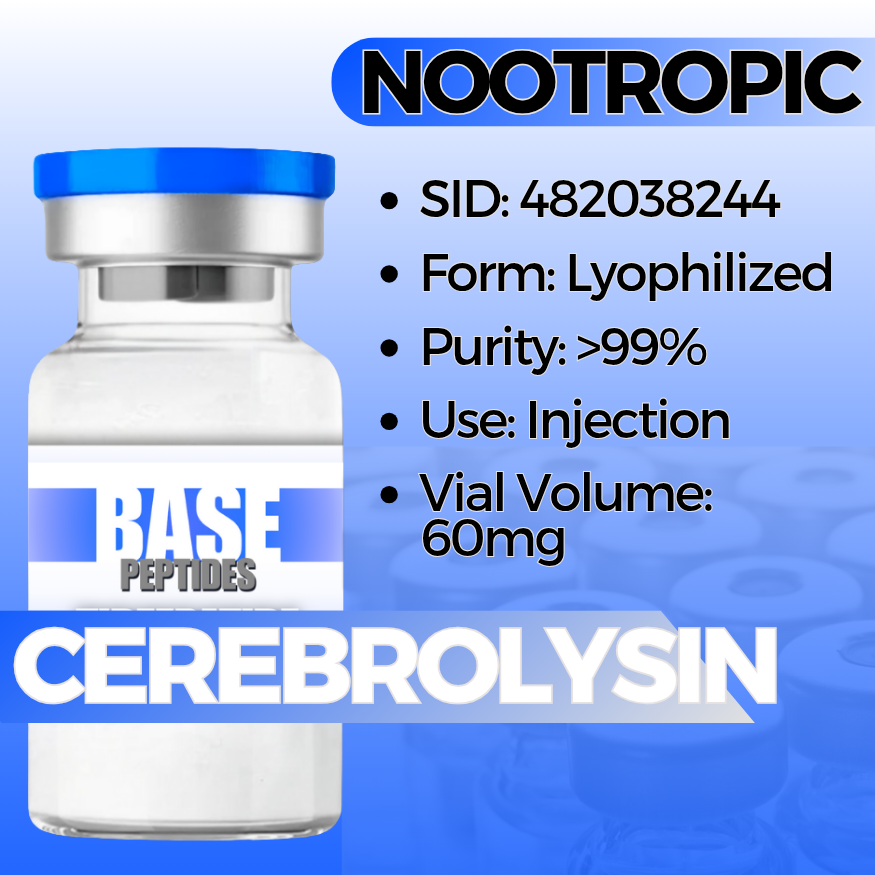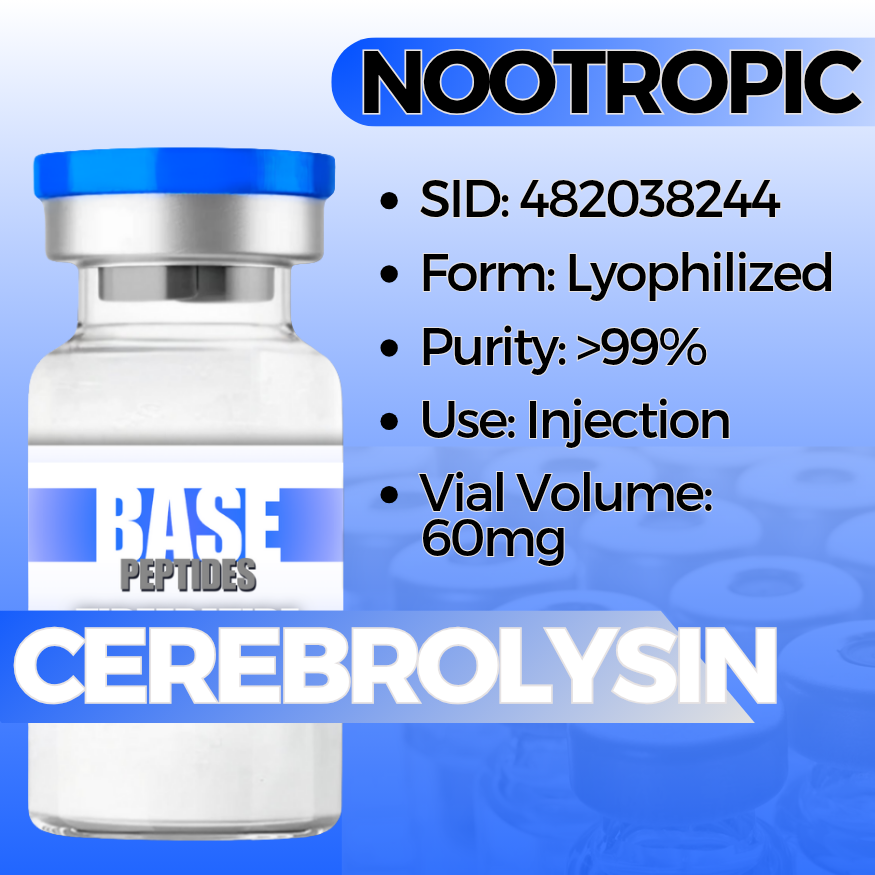Cerebrolysin
Cerebrolysin
Base Peptides are intended for licensed medical professionals and experienced researchers. Reconstitution required. Dosing and use instructions are not provided.
Couldn't load pickup availability
Cerebrolysin — Porcine Brain–Derived Neuropeptide Hydrolysate (Multi-Target Neurotrophic Preparation)
Cerebrolysin is a standardized mixture of low–molecular-weight neuropeptides and amino acids produced from purified porcine brain proteins. It’s used in research to study neurorecovery (repair and plasticity after injury) and neuroprotection (limiting secondary damage) in models of stroke, traumatic brain injury, and cognitive impairment.
- Type: Complex peptide hydrolysate (not a single sequence)
- CAS (mixture): 12656-61-0
- DrugBank: DB16599
- Usual description: “Cerebroprotein hydrolysate”; contains fragments with neurotrophic-factor-like activity (e.g., BDNF/GDNF/NGF/CNTF motifs reported in analyses).
- Signals like growth factors: Lab studies suggest components can mimic or modulate neurotrophic pathways that support neuron survival and plasticity.
- Protects during stress: Described effects include anti-excitotoxic, anti-oxidative, anti-apoptotic actions and inflammation modulation in injury models.
- Supports recovery: Associated with neurogenesis, dendrite/axon growth, myelination, and neurovascular unit integrity in preclinical work.
- To probe multi-pathway neurorecovery after ischemic or traumatic brain injury.
- To study cognitive outcomes and neuroplasticity markers in dementia or post-injury models.
- To compare complex peptide mixtures vs single peptides for trophic activity.
Key Studies — What Was Tested, What Changed, Why It Matters
Ischemic Stroke (human RCTs & meta-analyses)
- What was tested: Randomized controlled trials of Cerebrolysin given early after acute ischemic stroke.
- What changed: Meta-analyses report improved early neurological scores vs placebo with comparable safety; long-term functional benefits remain under active study.
- Why it matters: Provides a tool to examine neurorestoration paradigms alongside standard stroke care and rehabilitation.
Traumatic Brain Injury (clinical & translational)
- What was tested: Clinical cohorts and systematic reviews of Cerebrolysin added to standard TBI management and neurorehab.
- What changed: Reviews note better functional outcomes in several datasets; more high-quality trials are encouraged for definitive guidance. [oai_
- Why it matters: Useful for studying inflammation, synaptic repair, and recovery trajectories after head injury.
Cognitive Impairment / Alzheimer’s Disease
- What was tested: Trials and meta-analyses in mild-to-moderate Alzheimer’s disease and vascular cognitive impairment.
- What changed: Reports of modest improvements in cognition/global impression vs placebo; benefit–risk profile generally favorable in studied cohorts.
- Why it matters: Enables research on multi-target peptide mixtures in neurodegeneration alongside cholinergic or disease-specific tools.
Potential Research Applications
Neurorecovery After Injury
- Ischemia/reperfusion models; motor & cognitive endpoints
- Axonal sprouting, neurogenesis, myelination assays
Neuroprotection & Inflammation
- Excitotoxicity, ROS, apoptosis, BBB integrity
- Microglia/astrocyte signaling and cytokine panels
Neurodegeneration
- AD/VaD cognitive panels; electrophysiology & network measures
- Combination designs with cholinergic or trophic agents
Synergistic Peptides (for Study Design)
Semax / Selank
- Why pair: Short neuroactive peptides studied for stress adaptation and neuroplasticity; complement multi-target trophic signaling.
- Angle: Behavior + BDNF/cytokine gene-expression arrays for converging mechanisms.
SS-31 (Elamipretide)
- Why pair: Mitochondrial membrane support (cardiolipin, Δψm, ROS) alongside Cerebrolysin’s trophic signaling.
- Angle: Combine bioenergetics metrics with plasticity endpoints in injury models.
GHK-Cu
- Why pair: ECM/trophic gene programs that may complement neuronal repair readouts.
- Angle: Matrix + neurotrophic markers in co-culture or organoid systems.
Design Notes
- Declare source, lot, and concentration; this is a complex mixture, not a single peptide.
- Predefine primary endpoints (e.g., mRS/NIHSS in stroke models; GOS-E in TBI; ADAS-Cog in AD studies) to avoid outcome drift.
- Include mechanistic controls (trophic factor blockers, oxidative stress modulators) where relevant.
Known Concerns (Context)
- Heterogeneity: As a peptide mixture, composition is standardized but not a single defined sequence; design controls accordingly.
- Regulatory landscape: Approved/marketed in some countries for neurological indications; not FDA-approved in the U.S. for therapeutic use. Research-use only here.
- Evidence mix: Positive early outcomes (especially early neurological improvement), but long-term functional gains remain under evaluation; study quality varies by trial.
Follow institutional SOPs; document vehicle, timing, and co-interventions (rehab intensity, etc.).
Specifications & Handling
- Form: Sterile solution or lyophilized (supplier-dependent); lot-coded
- Composition: Low-molecular-weight peptides and amino acids from porcine brain protein hydrolysate
- Storage: Follow lot COA; protect from light; avoid repeated freeze–thaw
- In solution: Use sterile technique; record solvent, pH, and temperature
- Packaging: Tamper-evident; labeled for research use only
Regulatory & Use Notice
Sold for laboratory research use only. Not for human consumption, medical, or veterinary use. No human-use instructions are provided. Buyer is responsible for safe handling and regulatory compliance.
Cerebrolysin Research | Cerebroprotein Hydrolysate | Neurotrophic, Neuroprotection & Neurorecovery Studies (Stroke, TBI, Cognitive Impairment)


